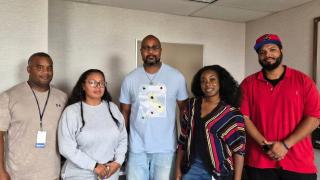
A lactation consultant's passion
Originally published by Hennepin Healthcare on Aug 27, 2024
We are drawn to passion. It's why you find yourself daydreaming of being an athlete, pop star, writer, Nobel Peace laureate, dancer, astronaut - fill in the blank. There's something about the light in their eyes. How the energy and excitement heighten the quality and tone of their voice when they talk about their work. The curiosity to understand how their thing impacts the world but also, how the world exists despite it. The most addictive of all is the drive to continually be better at their trade.
Is it any wonder that for National Breastfeeding Month, we're drawn to the heart and mind of lactation consultants. We had the opportunity to interview and be swept away by Jennifer Rian Mendiola, IBCLC:
When did you know - breastfeeding, I'm going to make a career out of this?
The turning point was when I went to a conference very early in my career in women's health. I heard the statistic that there's a 25% increased risk of getting type 1 diabetes when you don't breastfeed. My jaw dropped and I thought "what?" I heard other health implications and at that point I decided I needed to be an advocate. I needed to support women and families.
The health aspects got to me. It made me realize how important it is for me and our society to support families, and to build up parents' confidence.
What's the most common concern that breastfeeding parents have?
It's often about milk supply. Do I have enough? It's a very primal thing. We want our babies to be fed. And it's scary when you're not sure and you doubt your ability to provide.
If your baby is peeing regularly and having regular bowel movements, even if you don't see the milk being exchanged, you've got enough. From one feed to the next, you can ask: Does baby look satisfied? Is baby happy? Is their pee and poo normal?
The ultimate indicator is weight gain. As long as baby's weight gain is good, you have enough milk.
Is breastfeeding just a new-age trend? Why is it being so highly encouraged now?
Breastfeeding is hard because breastfeeding can be complex, and it is not familiar to many people. It's not uncommon that a first-time mom has never seen someone breastfeeding and just because you breastfed your last child doesn't mean it'll be any easier easy with your next child. Each couplet and situation is unique. With skilled support we can find a solution that works for parents and babies.
Lack of support is a primary reason why breastfeeding is so hard. We live in a society where money and support funnel to areas of high productivity and visible profit. There is nothing immediately profitable about breastfeeding, unfortunately. There is also a massive industry - the infant formula industry - that profits enormously from failed breast feeding and actively works to undermine breastfeeding families. This is why I believe we don't dedicate time and energy to building infrastructure to support breastfeeding families.
If we look at priorities of ancient humans, so much support went into breastfeeding mothers. After the baby was born, you quarantined for weeks. The birthing parent didn't leave the house. People brought food. They took care of them. The parent wasn't expected to do anything but recover and feed their baby. Other lactating family members even nursed the baby if there were problems. If the community didn't rally around this mother and child, the baby would die. The very future of this civilization depended on the care of parent and child. This is no longer the case.
Abysmal parental leave policies and low wages propel most breastfeeding people to go back to work within weeks or months after their baby is born. Working and maintaining breastfeeding is often at the forefront of parental concerns and contributes to early formula use. Research has shown that the earlier formula is introduced, the shorter the duration of breast feeding. Additionally, other relatives must work and do not have the leisure to support their family with the newborn. This leaves a lot of isolated families after their baby is born. Breastfeeding in isolation is difficult.
Most workplaces do not have supportive work environments for breastfeeding and pumping. Healthy foods aren't accessible or affordable. Families of color are disproportionately affected by all these barriers. Breastfeeding is truly an area that highlights the health inequities in our society.
There's a lot to be said for why breastfeeding is so hard. That's why breastfeeding people are amazing. So many succeed in an oppressive environment.
How have you changed through this work?
I've moved from this "ohh, why doesn't everyone breastfeed" to understanding that there's no room or space for ever belittling, shaming, or judging someone because of how they choose to not only feed their child, but care for and love them.
There's a lot of different ways to live and be in the world. We should focus on praising people's accomplishments, building them up and not tearing them down. If a baby gets formula, they're going to be okay. It's a good choice for families and they will still thrive.
It's not about convincing anybody to do anything. I'm supporting the parent in whatever way I can. A lot of my work is reassuring my patient that "you know what's best for your child and family. You know. I trust you and I want you to trust yourself."
What advice do you have for breastfeeding families?
Share your stories and experience. When we share our stories, we can learn from each other and support each other. Stories help validate feelings and experiences. It normalizes how parents feel on their breastfeeding journey. It's normal to be overwhelmed. You're not alone. It's a moment-by-moment process and what you feel today, may not be what you feel tomorrow.
There needs to be more stories about how well people are doing. We need to emphasize "you can do this. This is possible. We're here and we hear you."
About Jennifer
Jennifer Rian Mendiola, IBCLC has been supporting breastfeeding families for 25 years, starting as a doula for her sister when she birthed her first child, Aida. She loves empowering families to trust themselves as parents while supporting them on their breastfeeding journeys. Fun fact: Jennifer spent six months as a dog handler in northern Minnesota prior to switching careers to support birthing families.





